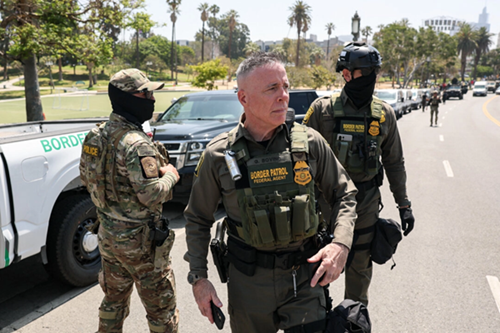Chicago Gang Suspect Charged Over Alleged Bounty on Border Patrol Chief
In a dramatic and concerning development that underscores the dangerous nexus between organized crime and immigration enforcement efforts, federal authorities have charged an alleged member of the notorious Latin Kings gang with conspiring to assassinate a senior immigration enforcement officer in Chicago. The targeted official, Gregory Bovino, has been at the forefront of an extensive crackdown on illegal immigration and associated criminal enterprises operating within the city. These enforcement actions have provoked significant hostility from local gang factions and criminal networks.
The Department of Homeland Security (DHS) announced on Monday that Juan Espinoza Martinez, a 37-year-old suspected Latin Kings gang member, now faces serious federal charges related to conspiracy to commit murder. Martinez is accused of offering a $10,000 bounty to fellow gang members and criminal associates to kill Bovino, who plays a key role in immigration enforcement operations targeting undocumented immigrants, many of whom have alleged connections to violent gangs.
According to federal investigators, Martinez took active and deliberate steps to organize the assassination plot. He solicited fellow gang members and associates to gather detailed and sensitive intelligence on Bovino’s whereabouts, daily schedule, travel routes, and security measures. This information was reportedly intended to enable a successful attack on the officer. Authorities believe this violent conspiracy was a direct response to Bovino’s aggressive enforcement efforts, which have resulted in numerous arrests and the disruption of illegal networks across Chicago.
In a press briefing, DHS officials emphasized the seriousness of the threat posed by the assassination plot. They highlighted that attacks on law enforcement officers are not only attempts to eliminate individuals but also calculated efforts to intimidate government agencies, undermine the rule of law, and hinder law enforcement’s ability to carry out their duties effectively. “This conspiracy serves as a stark reminder of the very real dangers faced by officers who put their lives on the line every day to uphold the law,” a DHS spokesperson stated.
Gregory Bovino is a senior officer within the Department of Homeland Security’s Immigration and Customs Enforcement (ICE) division. He has been instrumental in leading coordinated enforcement actions across Chicago, working closely with federal, state, and local law enforcement agencies. These operations focus on apprehending undocumented immigrants who are involved in gang activities, drug trafficking, violent crimes, and other serious offenses that threaten public safety.
The Latin Kings gang, known as one of the largest and most violent Hispanic street gangs in the United States, has a long and well-documented history of criminal activity, including drug trafficking, extortion, racketeering, and violent crimes. Law enforcement agencies nationwide have been engaged in ongoing efforts to dismantle this criminal organization and disrupt its influence in various communities.
Martinez’s alleged conspiracy to murder Bovino represents a brazen attempt to obstruct justice and retaliate against officials tasked with enforcing immigration laws. Investigators uncovered the plot through a combination of electronic surveillance, undercover operations, and intelligence gathered from confidential informants embedded within the gang. These combined efforts allowed law enforcement to intervene before the plan could be executed.
In addition to charges of solicitation to commit murder, Martinez faces conspiracy charges, which carry severe penalties including potentially lengthy prison sentences upon conviction. The Department of Justice is prosecuting the case with strong support from several federal and local agencies, including Homeland Security Investigations (HSI), the Federal Bureau of Investigation (FBI), and the Chicago Police Department.
Following the exposure of the assassination plot, security measures have been significantly heightened to protect Bovino and other key immigration enforcement personnel. DHS has reaffirmed its commitment to safeguarding its officers and allocating necessary resources to counter threats posed by violent criminal organizations.
Experts specializing in gang violence and immigration enforcement note that this case exemplifies the complex and often perilous environment that officers face in major urban centers with significant gang activity. The targeting of immigration officials marks an escalation in the tactics used by criminal gangs seeking to resist law enforcement efforts and maintain control over their illicit enterprises.
Community leaders and activists in Chicago have condemned the assassination plot and expressed solidarity with law enforcement officers like Bovino, who risk their lives to maintain public safety and enforce the law. “Violence and intimidation of this nature have no place in our city,” said a prominent local community advocate. “We stand firmly with those who protect our neighborhoods from crime and chaos.”
Legal analysts emphasize that the charges against Martinez send a clear and powerful message that violent retaliation against law enforcement officers will not be tolerated and will be met with the full force of the law. “Conspiring to murder a federal officer is among the gravest offenses under United States law and carries substantial legal consequences,” noted a criminal justice expert.
The investigation into this conspiracy remains ongoing. Authorities have indicated that additional arrests and charges may be forthcoming as they continue to dismantle the network involved in the assassination plot. Officials also stress the critical importance of sustained cooperation between federal, state, and local agencies to address the intertwined challenges of illegal immigration and gang-related violence.
This disturbing case highlights the extreme risks faced by immigration enforcement officers as they strive to uphold the law, protect communities, and disrupt criminal organizations that threaten public safety. Moreover, it serves as a sobering reminder of the broader security challenges confronting law enforcement agencies in cities grappling with elevated levels of gang activity and illegal immigration.
